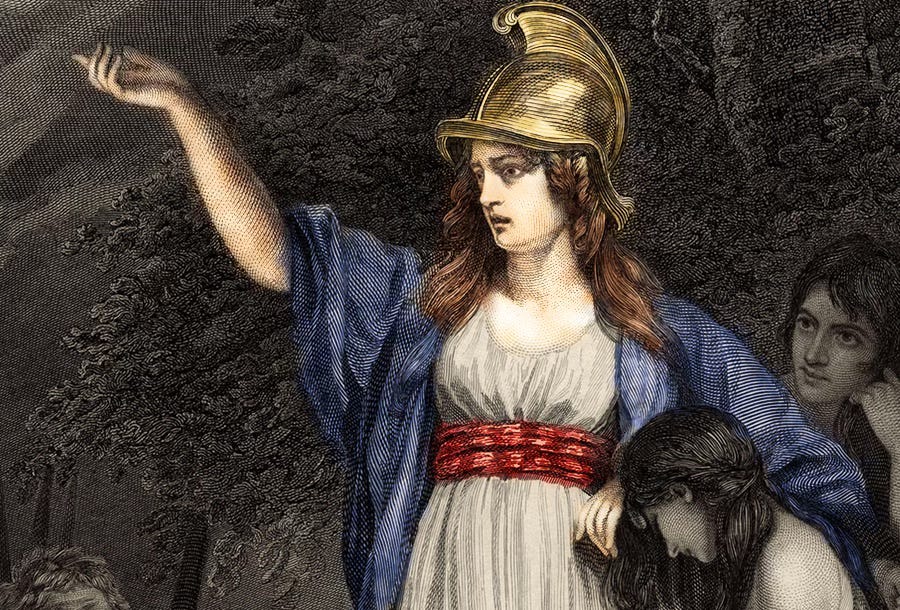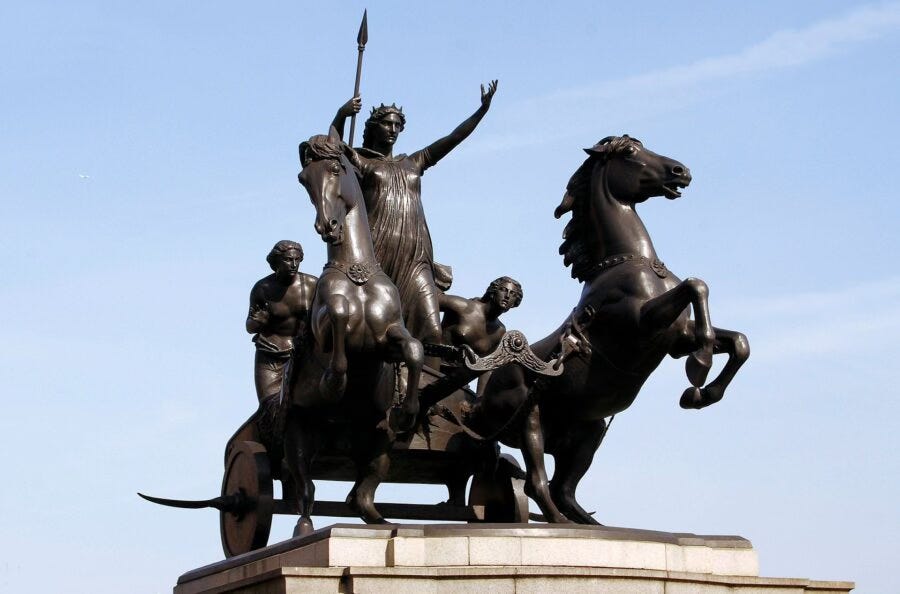Boudica and the betrayal of Britain's daughters
The spirit of Boudica must rise again
The notion of “British values” has been warped into globalist liberal values, erasing the identity of the British people. They do not acknowledge Britain’s rich history and culture or the spirit of its population. Nor were they intended to. Instead, they were created set to remove any form of national identity and replace it with multiculturalism.
British values do exist. However, they have been forgotten and demonised in order to undermine the nation’s identity. In order to make Britain great again and to fight against the evil we see, we must rediscover our own myths and legends.
Britain is at a crossroads and must choose whether it wants to fight against the decline or let its values, culture and people be erased. The native population are becoming second-class citizens. They are discriminated against in employment and lectured in education that they are the problem, entire bodies of DEI groups and legally protected roles are dedicated to their marginalisation, and the state uses their money to fund anti-British organisations.
The worst of this is that our institutions are complicit in the mass rape of young white girls by Pakistani men to avoid raising community tensions. Rotherham. Rochdale. Telford. Too many towns are now stained with the trauma of their young girls being groomed by men who have arrived only in the past decade.
This isn’t the first time Brits have faced oppression like this in their own country. And the hard truth is that this isn’t the first time we’ve seen our daughters violated by invaders.
The warrior queen Boudica saw it in her time. She saw her daughters defiled by Rome, her people crushed under the boot of an empire that took and took, offering only humiliation in return. But she did not weep. She did not beg. She rose. She burned their cities to the ground. She made them fear her.
And now, centuries later, we face the same betrayal. The same silence. The same surrender. But the question remains—will we rise as she did? Or will we kneel, as cowards do?
To ignore Britain's decline, to ignore the cries of Britain’s daughters, is to be fundamentally anti-British. It is to disappoint the spirit of our ancestors. Perhaps we can learn a thing or two from the warrior queen about how to act when our country faces adversity.
Boudica: The Avenging Mother of England
Many will know little about Boudica’s story or symbolism other than that she was an Iron Age queen who fought against the Romans. Her only significance in the national curriculum is that she’s an example of a strong, powerful woman, paraded by feminists, not for what she’s done but for who she was. To champion Boudica as merely a feminist icon is to do her a disservice.
Boudica is not some DEI implant in the history books. Her place is rightfully earned as a warrior queen who led one of the biggest revolts in our history for England’s sovereignty.
In AD 60, upon his death, the Icenian (in modern Norfolk) king Prasutagus, decided that half of his kingdom would go to the Romans and the other half would go to his two daughters. This was to keep the Romans happy while preserving the Iceini identity.
However, the Romans ignored Prasutagus’s will. Following the death of Prasutagus, the Romans thought this was the perfect time to strike. They used the opportunity to seize and pillage the kingdom. The Iceni people were treated like slaves. As the Roman historian Tacitus wrote: “his wife Boudicca was subjected to the lash and his daughters violated: all the chief men of the Icenians were stripped of their family estates, and the relatives of the king were treated as slaves.”
The Romans expected that the humiliation of Boudica and the rape of her daughters would force her to submit defeat. However, it had the opposite effect, inflaming her to get revenge.
Boudica and her army flew to arms in response to the Romans and incited a rebellion. According to Roman historian Cassius Dio, Boudica rallied her people against the Romans, saying, “But now, it is not as a noble descended from illustrious ancestors, nor as one ruling over a mighty people, that I avenge my lost freedom, my scourged body, and the outraged virtue of my daughters. I am but a woman; but I will not let the injustices suffered go unpunished. The Roman arrogance, their greed, their weakness—these shall be their downfall.”
She gathered her forces and rallied neighbouring tribes, united over the desire to end the Roman subjugation. She devised a plan to go against Britain's three largest towns of Roman Britain. The unpredictable, guerrilla-style fighting devastated the Romans. This includes burning Roman London (Londinium) to the ground. Her army grew to 230,000 troops. As Cassius Dio wrote, “Eighty thousand of the Romans and of their allies perish, and the island was lost to Rome.”
Unfortunately, when the Roman army assembled at the Battle of Watling Street, Boudica’s army was crushed. The Romans, while outnumbered, were better equipped and had better tactics than the Celts. According to sources, 80,000 Celts died at the battle, and only 400 were killed by Boudica’s army. Tragically, Boudica passed away shortly after her army was crushed.
What we should learn
Of course, I’m not advocating violence. We should not forget the spirit of fighting for our country, freedom, and justice. Even when the odds are against us, we must continue to fight for what is right. Those who want to save Britain should consider Boudica a real British hero and a woman who would do anything to protect her people. It’s in our DNA and heritage to fight for our little island, even when power is against us.
As a great man once said, “Situations are never hopeless. We shall be great again.”
Sources / Further Reading
Tacitus (n.d.) Boudica – Sources: Tacitus. Warwick Classics Network, University of Warwick. Available at: https://warwick.ac.uk/fac/arts/classics/warwickclassicsnetwork/romancoventry/resources/boudica/sources/tacitus/
Cassius Dio (n.d.) The Revolt of Boudica according to Cassius Dio. Translated by J. Jackson. Warwick Classics Network, University of Warwick. Available at: https://warwick.ac.uk/fac/arts/classics/warwickclassicsnetwork/romancoventry/resources/boudica/sources/cassiusdio/
Biographics May 21, 2019 Boudicca - The Celtic Warrior Queen
History Hit January 1 2024 The True Story of Boudica’s Revolt Against the Romans. YouTube video Available at:




An interesting article with alarming resemblance to the current situation.
The current stranglehold on the English people goes deeper than it did in ‘the Romans’ case, I fear. In this case, British people are arrested and pilloried for pointing out the incompatibility of a civilised culture with ‘the Romans’ by a system desperate to not offend ‘the Romans’.
That being said, a modern day Boudica would be a welcome return to Great British form. I pray for our countries sake that one arises.
Interesting article, though while the situations are similar I'd argue that the difference is that Britain isn't up against well-organized, mighty Romans but rather cowardly, spineless globalists and their pets.
You are wise madame to look to the ancient past though rather than false modern icons. It is there that we will find the best inspirations and heroes and examples with which to save our individual civilizations as I constantly point out in my essays (such as that of my Christendom essay) and in my serial stories.
Spiritually we need to rally, and realize that we are not wholly defeated and that we've been through worse and can come back as we have before.